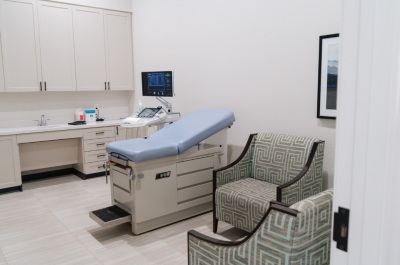
When Tonia walked through our doors at Prestonwood Pregnancy Center, she was ready to order abortion pills and had found a website that promised their arrival in three days. During the appointment, she shared her struggles and how pregnancy was not an option right now. She later shared, “I had already made my decision. I just wanted confirmation of how far along I was before I took the pills.”
What Tonia had not expected was the connection she felt when she saw her baby’s heartbeat — at just eight weeks — flickering on the ultrasound screen, or the compassionate, understanding staff with whom she shared her fears about parenting.
“I came in certain about ending my pregnancy,” she reflected months later, cradling her newborn son. “I left with the courage to continue it.”
Stories like Tonia’s highlight how dramatically the landscape has shifted for pregnancy centers in Texas. As Executive Director of Prestonwood Pregnancy Center, serving the Dallas/Fort Worth Metroplex, I’ve witnessed firsthand how the 2022 overturning of Roe v. Wade and the subsequent abortion ban in Texas have transformed our work — not end it.
While we celebrated these legal victories that affirmed what we’ve always known about the value of human life, we quickly realized we were entering a new chapter with unique challenges. Chief among these is the proliferation of online chemical abortion providers that have emerged to circumvent states with abortion restrictions.
These providers allow women to order abortion pills with minimal screening or follow-up care. After hearing stories from our clients about how easy it is to obtain abortion pills, we inquired ourselves to see if this was true and to learn better ways to counteract their prolific presence. What we were hearing was true. With just a few clicks of the mouse, no medical consultation, and a $40 charge to a credit card (with an inconspicuous line item labeled “women’s sanitary products” on the statement), within two days they were delivered and in our hands. Due to this accessibility, women are making life-altering, life-threatening decisions without comprehensive medical oversight or any emotional support or compassion whatsoever.
Many who support abortion claim they care for women. This does not demonstrate care for women; in fact, it shows complete disregard.
The circumstances bringing women to our center remain largely unchanged: financial instability, relationship issues, educational concerns, lack of support systems, and sometimes domestic violence. Making abortion illegal doesn’t automatically eliminate these underlying struggles but often illuminates them or makes them worse.
When women find practical solutions to their most pressing concerns, they often find the courage to choose life.
We help them understand that what they see as a problem can be a possibility. We help them slow down and respond, rather than react, to their situation. When we react, it is often without thought and counsel, but when we take the time to learn and evaluate, we respond and make healthier and better decisions.
Last year, we assisted 11 women through the abortion pill reversal process after they had second thoughts. One of those women came to us in tears just hours after taking mifepristone.
The first time we met Amara, she had a positive pregnancy test. Measuring eight weeks, she departed with her sonogram picture in hand, showing little emotion. We didn’t know she was a struggling mother of four, and her life already felt out of control.
Just 17 days after Amara’s first appointment, we received her frantic call. She had taken the abortion pill and was regretting it. She came to us that day, fearful she would be met with judgment, and asked about the abortion pill reversal. Instead, she was met with grace, compassion, and a tangible solution.
She asked, “Is it not too late? Can this really be reversed?”
A calmness fell over Amara as we saw her baby alive and well on the ultrasound. She then began the abortion pill reversal process and as we waited, we comforted her and prayed for her. Thanks to modern technology and the ability to get immediate messages to those who love and support our ministry, only God knows how many prayers were offered on Amara’s behalf that day.
Through prompt intervention with progesterone, she was able to continue her pregnancy. She now has a beautiful son, and they are thriving. And our help did not stop with the medication but continued with counseling, classes, and material resources.
Many clients have never experienced unconditional support. They expect judgment; they find acceptance. They expect pressure; they find presence. This creates space for thoughtful decision-making and often becomes the turning point in their journey.
My greatest prayer is that abortion would not only be illegal but unthinkable. Our culture needs a heart change. It is a spiritual battle and requires a spiritual answer. Jesus, the true-life transformer, with His extravagant love and unlimited grace, is the foundation of all that we do and offer.
Every day at Prestonwood Pregnancy Center and centers across America, we witness the courage of women who choose life despite difficult circumstances. We celebrate with them, cry with them, and commit to supporting them long-term. This is the foundation of our mission in this post-Roe landscape — not just saving lives but transforming them through love, truth, and unwavering support.
Leanne Jamieson is Executive Director of Prestonwood Pregnancy Center, founded by Pastor Jack Graham and Prestonwood Baptist Church in 1991. The non-profit pregnancy center has three locations in Richardson, Dallas and Fort Worth, Texas; along with a mobile unit that serves communities throughout the DFW Metroplex.








